WHO warns Latin America opening too soon: Coronavirus live news
Regional WHO director expresses concern about rising death rates in countries including Mexico, Costa Rica and Ecuador.

- Latin America has started to open too soon, the WHO’s Regional Director Carissa Etienne has warned.
- India has now reported more than five million cases of the coronavirus, the second country after the United States to report so many cases.
- Melbourne looks to be on course to ease out of a strict lockdown and curfew from September 28, as the average number of cases drops in the Australian city.
- Nearly 29.7 million people around the world have been diagnosed with COVID-19 and 937,543 have died, according to data from Johns Hopkins University. More than 20 million people have recovered from the disease.
Here are the latest updates:
Wednesday, September 16
20:23 GMT – Canada aims to triple daily coronavirus testing capacity to 200,000
Canada aims to more than triple its nationwide daily capacity of novel coronavirus tests to 200,000 and the federal government is providing $4.28 billion Canadian dollars ($3.25bn) to provinces to reach the goal, the government said.
Keep reading
list of 4 itemsMexico’s teachers seek relief from pandemic-era spike in school robberies
‘A bad chapter’: Tracing the origins of Ecuador’s rise in gang violence
Why is the US economy so resilient?
The funds are part of the $19 billion Canadian dollars ($14.42bn) that the government allocated for Canada’s Safe Restart Agreement reached with the provinces in July to help them restart their economies and contain the pandemic.
The money for testing can also be used towards contact tracing and sharing public health data.
Canada tested 56,695 people daily as of Tuesday, according to government data. Canada has the capacity to run more than 60,000 tests per day, chief public health officer Theresa Tam said on Tuesday.
19:10 GMT – WHO director warns Latin America is opening too early
Latin America has started to resume normal social and public life at a time when the COVID-19 pandemic still requires major control interventions, World Health Organization Regional Director Carissa Etienne said.
Speaking during a virtual briefing from Washington with other Pan American Health Organization directors, Etienne said coronavirus cases in Colombia’s border area with Venezuela have increased tenfold in the last two weeks.
Death rates are climbing in areas of Mexico, and similar trends are seen in Ecuador, Costa Rica and Bolivia, she said. Read more here.
18:50 GMT – French COVID-19 cases spike again, ICU figure at three-month high
The number of French people being treated in intensive care units for COVID-19 rose for the 20th straight day to a three-month high of 803, while the number of new daily cases was the third-highest on record.
French health authorities reported 9,784 new infections, just below the 10,561 daily all-time high reached on Saturday, bringing the cumulative number of cases to 404,888, the second-highest in Western Europe behind Spain.
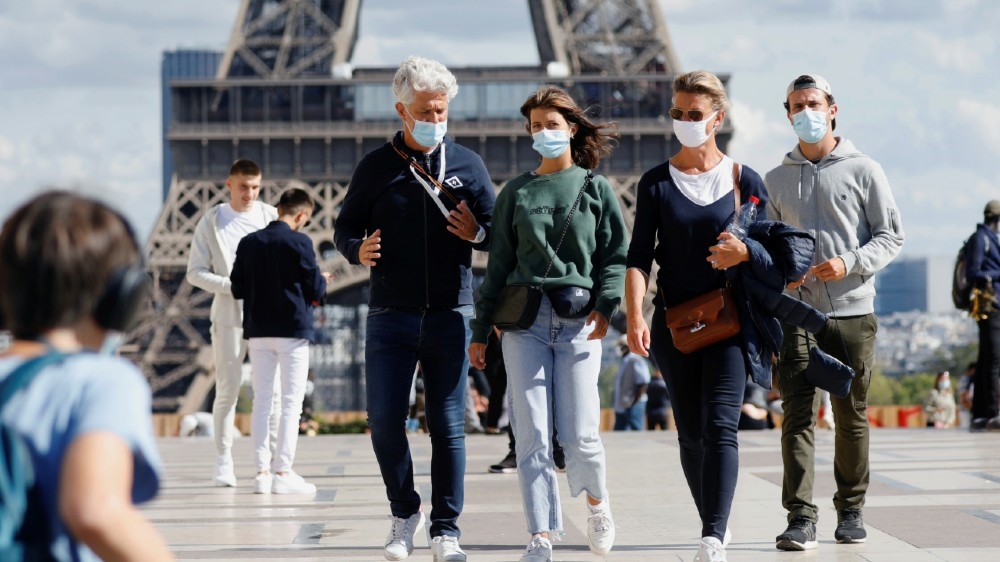
The number of people in ICUs is still almost nine times lower than the April 8 peak of 7,148, but the upward trend is putting a renewed strain on the hospital system in certain parts of the country, such as Marseille.
The total figure for COVID-19 hospitalisations increased by 140, at 5,819, rising by more than a hundred for the third day in a row, a sequence unseen since April 14, when that number reached its record of 32,292.
The number of people in France who have died from COVID-19 infections rose by 46 to 31,045. That figure is higher than the seven-day moving average of 36, which itself is at its highest since the beginning of the month.
18:15 GMT – Irish COVID-19 modeling group warns of exponential increase in cases
The head of the Republic of Ireland’s COVID-19 modelling group said he was more concerned about the rise in cases of the disease in the country than at any time since its first peak in April and warned of “exponential growth”.
“Case numbers appear to be growing exponentially and are likely to double every 10 to 14 days if every one of us does not immediately act to break chains of transmission of the virus,” Professor Philip Nolan, Chair of the Irish Epidemiological Modelling Advisory Group, told journalists.
Ireland’s health service on Wednesday reported 254 new cases and three new COVID-19 related deaths, bringing the total death toll since the start of the pandemic to 1,788.
17:45 GMT – Germany adds Vienna and Budapest to risk list
Germany has added Austria’s capital Vienna and Hungary’s capital Budapest to its pandemic risk list due to the rising number of coronavirus infections there, authorities said.
Germany also added the Hauts-de-France region in neighbouring France as well as the Fribourg canton in Switzerland to the list, the Robert Koch Institute for disease control said.
17:30 GMT – US CDC reports 195,053 deaths from coronavirus
The US Centers for Disease Control and Prevention (CDC) reported 6,571,867 cases of the virus for September 15, an increase of 34,240 cases from its previous count, and said the number of deaths had risen by 961 to 195,053.
The CDC figures do not necessarily reflect cases reported by individual states.
17:05 GMT – WHO warns of coronavirus momentum as winter looms in north
The WHO has warned that COVID-19 is spreading at a worrying pace in some parts of the northern hemisphere, a few months away from the winter influenza season.
“We are starting to see worrying trends in some countries,” Maria Van Kerkhove, WHO technical lead for COVID-19, said during a social media webcast.
|
|
“We are seeing increases in hospitalisations in intensive care units, particularly in Spain, France, Montenegro, Ukraine and some states of the United States. That is worrying because we have not seen the flu season yet.”
Van Kerkhove also said hospitalisations of people aged 15-49 infected with COVID-19 were increasing in several countries.
Dr
Mike Ryan, the WHO’s top emergency expert, advised people at high risk for COVID-19 infections to get a flu vaccination.
17:00 GMT – US outlines sweeping plan to provide free COVID-19 vaccines
The United States federal government outlined a sweeping plan to make vaccines for COVID-19 available for free to all Americans, even as polls show many people are sceptical.
Read more here.
16:00 GMT – US Supreme Court extends pandemic-related restrictions
The US Supreme Court will remain closed to the public and will conduct its October oral arguments by teleconference as it extends coronavirus-related restrictions into its new term, a court spokeswoman said.
The court’s announcement means that members of the public cannot tour the building and lawyers will present their oral arguments by phone instead of in the courtroom itself.
|
|
The court for the first time heard arguments by teleconference in May as a precaution against the spread of the coronavirus.
The coming term begins on October 5 and is due to run until June 2021.
15:50 GMT – New York mayor furloughs himself, staff for week to ease pandemic budget gap
Everyone in the New York City mayor’s office – including the mayor himself – will be furloughed for one week without pay starting from October 1 to close a budget shortfall created by the pandemic, Mayor Bill de Blasio has announced.
The coronavirus outbreak had caused the city to lose $9bn in revenue and forced a $7bn cut to the city’s annual budget, de Blasio told reporters.
The furloughs will save only about $1m, the mayor said, but may serve as a useful symbol as he continues to negotiate with labour unions representing municipal employees over broader payroll savings.
De Blasio plans to work without pay during his own week-long furlough, The New York Times reported.
The policy will affect 495 staff members, the Times reported, and the week-long furloughs will be staggered among them between October and March 2021.
De Blasio has warned he may have to lay off 22,000 city employees if savings cannot be found in the negotiations with the labor unions.
15:30 GMT – British PM Johnson does not want second national coronavirus lockdown
United Kingdom Prime Minister Boris Johnson has said he does not want to see a second national lockdown to combat the coronavirus pandemic, saying it would be completely wrong for the UK and be financially disastrous.
|
|
“I don’t want a second national lockdown,” he told a parliamentary committee.
“I think it would be completely wrong for this country and we are going to do everything in our power to prevent it … I very much doubt that the financial consequences would be anything but disastrous.”
14:40 GMT – Coronavirus pandemic to cost football $14bn this year, says FIFA
FIFA has put the cost of the coronavirus pandemic on football around the world at $14bn in lost revenue.
That figure accounts for about a third of the game’s global economic value with the club and national game worth about $46bn worldwide.
The pandemic has already led to more than 150 football associations seeking financial help from the $1.5bn emergency relief fund set up by football’s governing body.
Read more here.
14:00 GMT – Peru’s coronavirus cases show signs of stabilising
Authorities in Peru have reported that coronavirus cases are stabilising in the Andean country, with some regions exhibiting a downward trend after months of lockdown.
Peru has recorded nearly 740,000 cases of the coronavirus, the fifth-highest caseload in the world, and 30,927 deaths as of Tuesday (September 15).
It has tracked one of the world’s deadliest fatality rates per capita, with 94 deaths per 100,000 residents.
However, authorities say positive results from lockdown are starting to come through.
12:46 GMT – Palestinian refugee agency warns of instability amid crisis
The United Nations Relief and Works Agency for Palestine Refugees (UNRWA) is experiencing a financial crisis that could force it to halt some services to an already impoverished population of more than five million people, the head of the agency said.
Philippe Lazzarini also warned in an interview with The Associated Press news agency in Beirut that the spread of the novel coronavirus, an economic meltdown in Lebanon and a huge deficit in UNRWA’s budget are deepening the hopelessness among Palestinian refugees, some of whom are trying to flee the Mediterranean nation on migrant boats.

12:20 GMT – Johnson says UK record on testing compares well with European peers
The United Kingdom’s record on COVID-19 testing compares well with other European countries and the government is working hard to turn them around even more quickly, British Prime Minister Boris Johnson has said.
“Most people looking at the record of this country in delivering tests across the nation will see that it actually compares extremely well with any other European country. We’ve done more tests than any other European country,” he told parliament.
11:48 GMT – Global economic outlook not as bad as expected – OECD
The global economy is not doing as badly as previously expected, especially in the United States and China, but has still suffered an unprecedented drop due to the coronavirus pandemic, an international watchdog said.
The Organisation for Economic Co-operation and Development (OECD) said in a report that the world’s gross domestic product (GDP) is projected to decline by 4.5 percent this year – less than the 6 percent plunge the OECD had predicted in June.
The global economy is expected to rebound and grow by 5 percent next year, the organisation said.
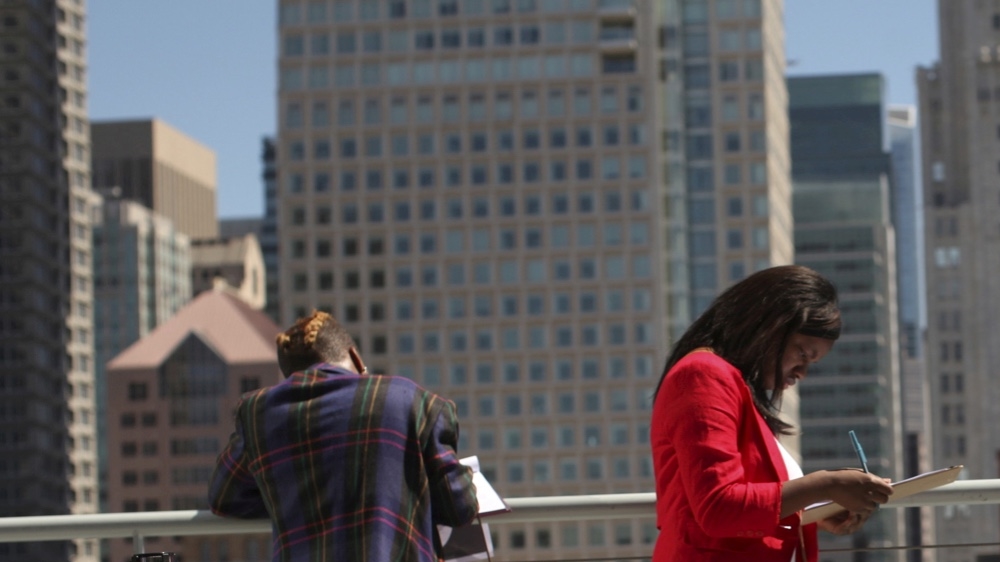
11:11 GMT – Lilly says antibody reduces need for hospitalisation for moderate COVID-19 patients
Eli Lilly and Company said its experimental antibody reduced the need for hospitalisation and emergency room visits for patients with moderate COVID-19 symptoms, according to an interim analysis of a mid-stage clinical trial.
The study tested three different doses of LY-CoV555, a manufactured antibody designed to recognise and lock onto the novel coronavirus, preventing the infection from spreading.
10:30 GMT – Russia to sell 100 million doses of COVID-19 vaccine to India
Russia’s sovereign wealth fund has agreed to supply 100 million doses of its coronavirus vaccine, Sputnik-V, to Indian drug company Dr Reddy’s Laboratories, the fund said on Wednesday, as Moscow speeds up plans to distribute its shot abroad.
The deal comes after the Russian Direct Investment Fund (RDIF) reached agreements with Indian manufacturers to produce 300 million doses of the vaccine in India, which is a major consumer of Russian oil and arms.
10:13 GMT – Ukraine bars entry to 1,000 Jewish pilgrims over virus
More than 1,000 Hasidic Jewish pilgrims – including children – were massed at the Ukraine-Belarus border after Kyiv denied them entry due to coronavirus restrictions, the two countries said.
Tens of thousands of Hasidic Jews travel every Jewish New Year to the central Ukrainian town of Uman to visit the tomb of Rabbi Nachman, the founder of the Breslov Hasidic movement.
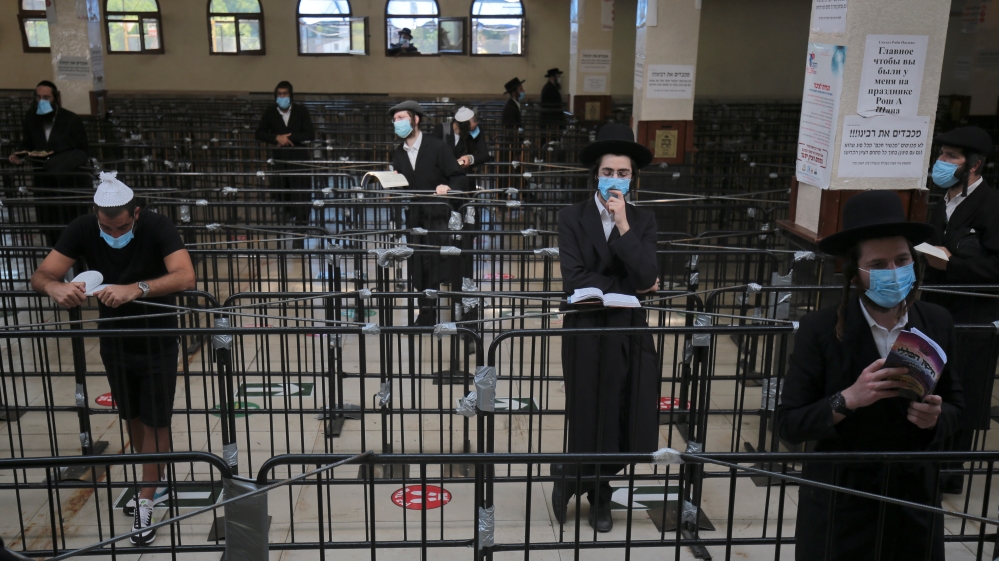
09:45 GMT – Infections surge in Czech Republic
The Czech Republic has registered another steep rise in coronavirus infections, with the number of new confirmed cases surpassing 1,600 in one day for the first time.
The health ministry says the day-to-day increase reached a new record of 1,677 on Tuesday. The record was broken four times last week.
09:10 GMT – Vietnam to resume international flights, but not tourism
Vietnam will resume international commercial flights connecting the country to several Asian destinations starting from Friday, after a months-long shutdown to curb the coronavirus outbreak.
The flights, however, are reserved for Vietnamese nationals, diplomats, experts, managers, skilled workers, investors and their families. They are not yet available for tourists.
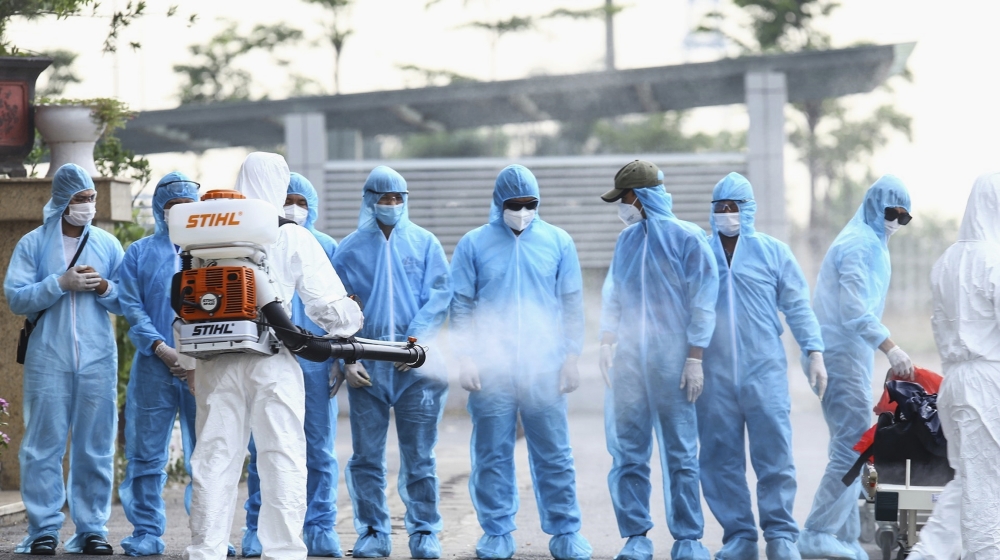
08:30 GMT – Philippines confirms 3,550 new coronavirus infections, 69 deaths
The Philippines’ health ministry recorded 3,550 additional novel coronavirus infections and another 69 deaths.
In a bulletin, the ministry said total confirmed cases had risen to 272,934, the most in Southeast Asia, while confirmed deaths have reached 4,732.
07:53 GMT – More than 300 Indian jails infected with COVID-19 – NCAT
At least 351 jails across India, from a total of 1,350, have reported coronavirus infections, according to The National Campaign Against Torture.
Uttar Pradesh, Madhya Pradesh and Maharashtra were the states with the most prisons infected.

07:17 GMT – Serum Institute gets approval to resume Indian trial of AstraZeneca COVID vaccine-source
The Serum Institute of India has received Indian regulatory approval to resume local clinical trials of AstraZeneca’s potential COVID-19 vaccine, a source familiar with the matter said.
The approval came from the Drugs Controller General of India, the source said.
AstraZeneca has resumed British clinical trials of the vaccine – one of the most advanced in development against COVID-19 – after they were paused earlier this month following a serious side effect in a trial participant.
06:45 GMT – Infographic: How coronavirus spread across India
06:10 GMT – Ukraine reports record daily high in coronavirus deaths
Ukraine has registered a record 76 deaths related to the new coronavirus in the past 24 hours, the national security council said on Wednesday, up from a record of 72 deaths registered last week.
The council said 162,660 cases were registered in Ukraine as of September 16, with 3,340 deaths and 72,324 people recovered.
Hello, this is Usaid Siddiqui in Doha taking over from my colleague Kate Mayberry.
05:30 GMT – China begins trials of world-first nasal spray vaccine: report
Caixin is reporting that China has begun human trials of a coronavirus vaccine delivered as a nasal spray that could provide an alternative to injections.
It’s the first vaccine of its kind in the world to proceed to human trials, Caixin said, citing the WHO’s latest list of vaccine candidates.
The vaccine is being developed by Hong Kong University, Xiamen University and a Beijing-based vaccine manufacturer.
|
|
04:40 GMT – ‘Not comfort food’: Scorsese speaks out at Toronto Film Festival
Oscar-winning film director Martin Scorsese has warned cinema is becoming “marginalised and devalued” as a “form of comfort food” during the coronavirus pandemic.
Scorsese made the comments in an introductory video to the Toronto Film Festival, where he praised the organisers for going ahead with the event, North America’s largest film festival.
Toronto is taking place mainly online this year, along with a handful of drive-in and limited capacity indoor screenings.
04:00 GMT – India cases exceed five million
Cases of coronavirus have passed the five million mark in India after the authorities confirmed 90,123 new cases on Wednesday.
India is second only to the US in the number of cases confirmed.
Its death toll is much lower, however.
The health ministry said on Wednesday an additional 1,290 people had died from COVID-19, bringing the death toll to 82,066. Nearly 196,000 people have died from the disease in the US.
You can read more on that story here.

03:30 GMT – UN could meet on pandemic, in-person, before year-end
The United Nations could hold an in-person meeting of the General Assembly New York as early as November to discuss the COVID-19 pandemic.
Assembly president Volkan Bozkir says discussions are continuing with some countries concerned about meeting so soon – especially in the United States, where the virus continues to spread widely.
Bozkir is keen to start in-person UN meetings, which have taken place via video conference since March, as soon as possible, saying such a summit should have happened “in June”.
02:55 GMT – Air New Zealand plans to fire more cabin crew
Air New Zealand plans to cut as many as 385 more cabin crew jobs because the coronavirus has forced it to reduce international routes.
The reductions would bring its COVID-19 related job losses to around 37 percent of its workforce, which is higher than both Qantas and Singapore Airlines.
in announcing the decision, Air New Zealand noted the decline in demand on North American routes. It now operates return flights to Los Angeles three times a week rather than daily and has converted its San Francisco flights to cargo only.
02:35 GMT – Japan commits $135m to WHO’s global vaccine programme
Japan has committed 17.2 billion yen ($165 million) in funds for the WHO’s global COVID-19 vaccine programme, known as COVAX.
The initiative is aimed at helping buy and fairly distribute a COVID-19 vaccine to countries around the world. But some countries which have secured their own supplies through bilateral deals, including the United States, have said they will not join.
Japan has also pursued independent arrangements with global pharmaceutical companies to secure vaccines, with the government pledging to have enough supply for the whole population by the first half of 2021. The COVAX programme has set a September 18 deadline for contributions.
02:30 GMT – Hong Kong wraps up mass testing programme
Hong Kong has wrapped up a mass testing programme that fuelled controversy because of the involvement of experts from the mainland.
About 1.78 million specimens were collected in the two-week exercise with 45 COVID-19 cases found as a result of the testing and associated contact tracing, according to the government.
The territory, which is home to about 7.5 million people, is to begin relaxing some of its coronavirus curbs from Friday.

02:20 GMT – China suspends poultry imports from second US plant
China has suspended imports from an OK Foods poultry plant in Arkansas, because of coronavirus cases among workers, according to the USA Poultry & Egg Export Council.
It’s the second US poultry factory to be blocked because of an outbreak among employees. “We don’t think that either one of these two are justified, especially considering the fact that the virus cannot be transmitted in poultry meat,” said Jim Sumner, president of the USA Poultry & Egg Export Council.
Chinese customs authority GACC suspended imports from the OK Foods facility, he said. The Arkansas plant became ineligible to ship products to China on September 13, according to the US Department of Agriculture.
02:00 GMT – Trump quizzed on COVID-19 response at election town hall
US President Donald Trump has been questioned by voters on his coronavirus response at a town hall meeting in Pennsylvania.
Asked by one uncommitted Pennsylvania voter why he had played down a pandemic that was known to endanger low-income families and minority communities, he claimed he had done the opposite.
“I didn’t downplay it. In many ways I up-played it in terms of action,” Trump said at the event, which was sponsored by ABC News.
“You do not admit to it yourself?” the voter, Ajani Powell, interrupted.
Trump continued, “Yeah, because what I did is with China, I put a ban on. With Europe, I put a ban on and we would have lost thousands of more people had I not put the ban on. So, that was called action. Not with the mouth but in actual fact.”
He also said a vaccine would probably be available soon. “We’re very close to having a vaccine,” he told the audience. “We’re within weeks of getting it you know could be three weeks, four weeks.”
|
|
01:00 GMT – Victoria on course to ease Melbourne lockdown by month’s end
Australia’s Victoria state looks to be on course to relax a strict lockdown in the city of Melbourne by the end of the month after the average number of cases over the last two weeks dropped below 50, which is within the target range for the state to ease restrictions from September 28.
The fall in cases in recent days – 42 were reported across the state on Wednesday – from early August’s triple-digit highs means some curbs will be eased in rural areas of the state late on Wednesday.
In these places, outdoor gatherings of up to 10 people will be permitted, residents of a household will be allowed to visit one other home, and cafes will be able to seat up to 50 people outside.
#COVID19VicData UPDATED: We have reissued today's data as there are 81 cases with unknown source in Metro Melbourne, not 82, as earlier tweeted. Yesterday there were 42 new cases reported and 8 lives lost. Info: https://t.co/eTputEZdhs pic.twitter.com/buI8b9yv7J
— VicGovDHHS (@VicGovDHHS) September 15, 2020

00:00 GMT – Poorly-fitting masks increase risk to health workers who are female or Asian: study
A new study has found female healthcare workers and medical staff with Asian heritage are more vulnerable to COVID-19 infection because they are less likely to be using face masks that fit them properly.
The analysis published in the journal Anaesthesia looked at studies into the assessment of filtration masks like the N95 and FFP2 models, which are used by medical workers in high-risk situations.
Their review looked at research that showed higher initial fit-pass rates in Caucasians (90 percent) compared with Asians (84 percent) and said particularly low initial fit-pass rates were found in Asian women, with a reported average of just 60 percent.
In the US, the report said authorities use a fit-test panel to assess the suitability of the N95 masks provided to healthcare workers, but they noted that the facial dimensions represented by the panel were based on a group of people in which women and Asians were “underrepresented”.
In many countries around the world, women make up at least three-quarters of all healthcare staff. The authors said that to ensure a mask is not liable to leak, it needs to adequately fit the face shape of the wearer, adding that fit appears to be more important for protection from airborne viral spread than the filtration capacity of the mask itself.
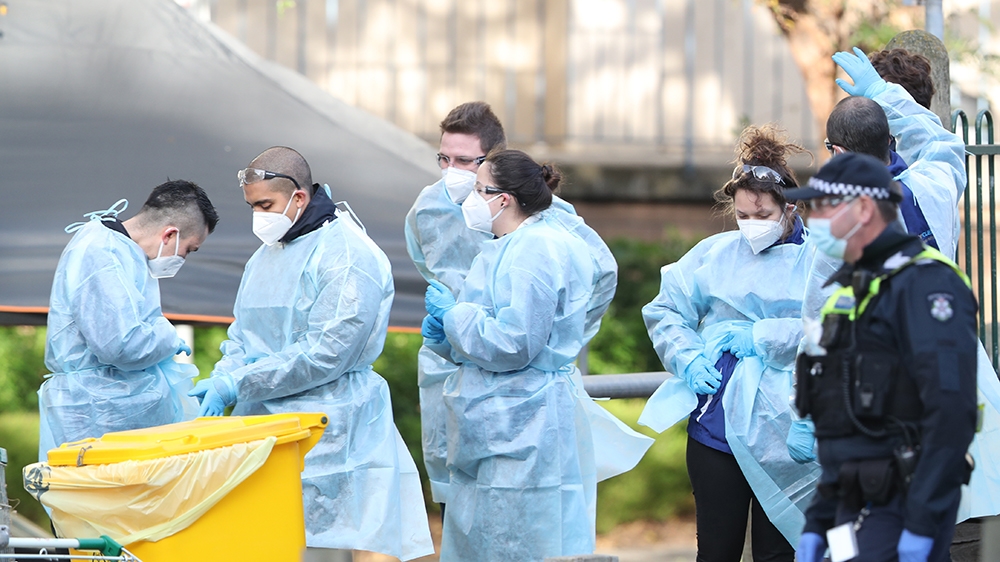
—-
Hello and welcome to Al Jazeera’s continuing coverage of the coronavirus pandemic. I’m Kate Mayberry in Kuala Lumpur.
Read all the updates from yesterday (September 15) here.